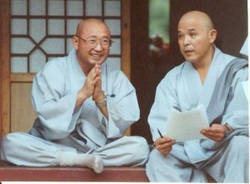Editor’s note: Zen Master Su Bong Mu Deung, originally See Hoy Liau, began practicing with Zen Master Seung Sahn in 1974, received inka from him in 1980, and in 1992 was one of the first three Zen Masters to receive transmission from Seung Sahn in the Kwan Um School of Zen. He died suddenly in Hong Kong at age 51 while giving a kong-an interview in 1994. After his death, the Hong Kong Zen Center was renamed Su Bong Zen Monastery. In celebration of its twentieth anniversary, Su Bong Zen Monastery recently published a collection of Su Bong’s teachings in English and Chinese.
When you come to practice, you are sitting and your legs are sore, your brain hurts, your whole world is one form or another of pain, and the only thing you can think of is struggling. But who are you struggling for? You are struggling for “me.” “I want no pain, I want no thinking, I want a good feeling.” We always say, take away this “I.” If you take away this “I,” your meditation will be what we say in Hawaii is “like a breeze,” meaning very good, very easy. If you take away this “I” and you don’t make this practice for yourself, you have nothing to lose. You have no investment for yourself. It’s like somebody gives you money, and this is not your money, and you use it for others and not for yourself.
If your practice is not for you, then very strangely, you don’t care if you are practicing hard or not. Also you don’t care whether it is correct or not correct. You have nothing to gain and nothing to lose. Then you only relax. Very interesting, you know. The name for that is freedom.
In 1970, in America, one very famous singer [Janis Joplin] died early. The last song she made was very interesting. “Freedom is just another word for nothing left to lose.” If you lose your “I, my, me” you have nothing left to lose, and the name for that is freedom.
The other day at the Buddhist Youth Center I said, “Buddhas, Bodhisattvas, and Zen Masters do not want your money, do not want your husband, do not want your wife, do not want your car, but they want your life.” What is the meaning of that? The meaning is: “take away your Small I and catch your Big I.” That’s what “wanting your life” means. The bodhisattva’s freedom is absolute freedom. If water spills on the floor, he wipes it up, no choice. We call that freedom. When the moktak master hits the chukpi during practice she cannot decide whether she wants to hit it four times or only one time. She must only hit it three times because the head dharma teacher says, “Only three times.” The name for that is freedom, but nobody understands that kind of freedom. Everyone says that a monk is a leaver of home, one who goes away from this world. Many people say monks are those who have freedom from this world. If you ask Zen Master Seung Sahn, “what is a monk?” he would say, “only follow situation.” Only following situation for others is true freedom.
*
“Becoming independent” doesn’t mean “I become independent.” Truly “becoming independent” means this world can depend on me. Understand? My parents, my family, my friends and my country can depend on me—that means becoming independent. “I am independent so I can do whatever I like” is not correct independence. Becoming independent means “this world can depend on me.” Then what? Everything can depend on you, so you and everything become harmonious. Also, “everything can depend on me” means “I am dependent on everything.”
Here is a simple example, OK? I am driving and a red light appears, so I am dependent on the red light. This red light directs my life. Then I stop, so this world is dependent on me, and the other drivers can trust me. This driver is coming this way; I am going that way. Red light, I stop, so this driver can believe me. He can depend on me, but my action is dependent on this red light.
Zen means correctly perceiving the situation clearly. Then what is my relationship? Then what is my function? This is correct life.



